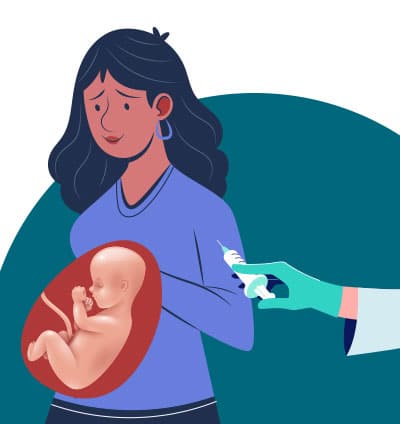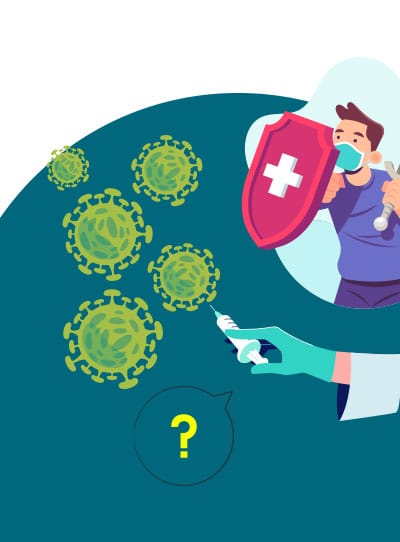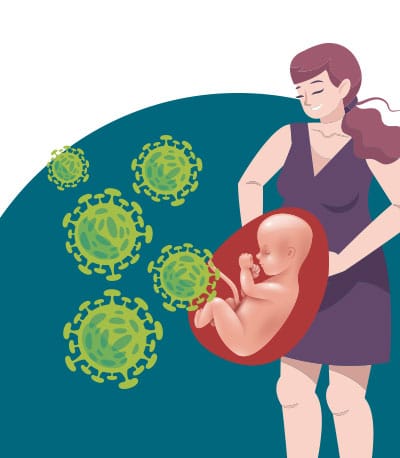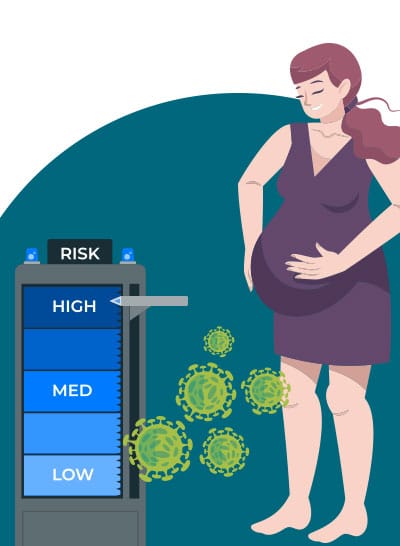The COVID Vaccine and Pregnancy: The Facts
All About SurrogacyCommon COVID Questions We Hear
There’s no question that the COVID pandemic is the biggest single health story of the decade. Maybe that’s why we hear so many prospective surrogates and intended parents asking about the safety of the vaccine during pregnancy. Indeed, this vital question is relevant to anyone considering becoming pregnant, not just those involved in the surrogacy journey.
Actually, there are three questions we typically get about the COVID vaccine and pregnancy, and they break down like this. First, what’s the situation with taking the vaccine before pregnancy, for example, when you’re planning to have a baby?
Second, if you’re already pregnant, are there any special risks associated with the COVID vaccine? And finally, how might the vaccine affect women who have already delivered a child and are currently breastfeeding?

It’s an important topic and women need to know the answers to the key questions if they are pregnant, thinking about becoming pregnant, have recently delivered, or simply want more information about surrogacy in general.
And just as with any crucial health-related topic, it’s imperative to check with authoritative sources, like the official CDC (Centers for Disease Control) website, for example, rather than rely on what you read on non-official websites. And remember to always double-check the information you find with your own physician just to be on the safe side.
While Planning a Pregnancy
For women who are not yet pregnant but wish to either become surrogate or traditional parents, the CDC notes that the COVID vaccine and pregnancy are a smart combination. That’s because the vaccine is recommended for all people past the age of 12, whether currently pregnant, thinking of becoming pregnant, or not sure whether they’ll ever get pregnant.

Fertility Questions
Another common question related to the COVID vaccine and pregnancy for women who are not yet pregnant is this: “Does the vaccine have the potential to reduce my overall fertility?” The answer, according to Hopkins Medicine, is no. The source explains that there is no reason for women to put off getting the vaccine just because there are currently trying to become pregnant.
Prevent Severe Illness
One reason the COVID vaccine and pregnancy topic is of such crucial importance is that the illness, if you contract it while pregnant, can be especially dangerous. Hopkins Medicine refers to various studies, including some done at the CDC, which revealed that pregnant women are in a high-risk group for the illness and need more intensive health care if they do contract COVID while pregnant.
That’s just another reason for women who are planning to get pregnant to protect themselves and their babies by getting the vaccine as soon as they can, and not wait until after they conceive.
During Pregnancy
What about women who are already pregnant but have not yet been vaccinated? The CDC points out that the vaccine is just as safe for pregnant women as it is for those who are planning a pregnancy or who are breastfeeding.
200,000 Women So Far
In fact, more than 200,000 women who are currently pregnant have had either the Moderna or Pfizer vaccine (both of which are the mRNA variety) and not reported any adverse health issues.
Which Pregnant Women Should Be Vaccinated?
According to the American College of Obstetricians and Gynecologists (ACOG), it’s not a matter of which pregnant women should be vaccinated. The organization encourages all women who are pregnant to receive the COVID vaccine.
When it comes to the COVID vaccine and pregnancy, the evidence is clear. All authoritative sources, both the governmental CDC as well as private professional entities like Hopkins Medicine and the ACOG, say that the safest course of action for pregnant women, as well as those planning to become pregnant, is to get vaccinated as soon as they can.
While Breastfeeding
The same source, the CDC, also points out that even women who are actively breastfeeding should have the vaccine. Yet, even an authoritative organization like the CDC still suggests that all women speak with their individual health providers about the vaccine before they receive it. Why?
Because there’s always the slight chance that some unique factor of your physical health might need to be taken into consideration before you receive the COVID vaccine.

Will the Vaccine Immunize the Baby?
Whether you are currently pregnant or breastfeeding, there is some research that suggests the vaccine’s protective power can be transmitted to your baby. How does this happen?
Apparently, according to the research, when the vaccine enters the mother’s body, it causes the blood to produce antibodies which fight the disease. Those antibodies can be passed from the mother to the fetus via the placenta or from the mother to the baby via breast milk.

Can the Vaccine Cause the Illness?
Whether you’re breastfeeding, planning a pregnancy, or currently pregnant, it’s important to understand that there’s a lot of misinformation out there. The fact is that the coronavirus vaccine cannot cause you to become ill with COVID-19.
Note that people who do have a few of the milder side-effects from getting the vaccine are not coming down with COVID. Instead, their bodies are reacting in a natural way, namely displaying an immune response, from the vaccination. There is no danger of contracting COVID from the vaccination.



Can a Vaccinated Mom Transmit COVID to her Fetus or Baby?
The Mayo Clinic explains that when a mother receives the COVID vaccination, there is no risk at all for the baby or fetus getting the disease as a result.
One of the many reasons for this is that the vaccine used for pregnant women does not contain any viral components that are live. In other words, there is not a chance that the vaccine will create the replication of a so-called “live virus” in a fetus or baby when the mother receives the shot.

Why are Pregnant Women at Increased Risk?
According to the Mayo Clinic, one of the unique factors about pregnant women is that their bodies tend to have a less potent immune system than non-pregnant women. That means that if you are pregnant and not yet vaccinated against COVID, you’re actually taking a chance with your health.
But the Mayo information goes even further and explains that when pregnant women do in fact come down with COVID, their health outcomes tend to be more severe than non-pregnant women. For example, someone who is pregnant and contracts COVID has a higher likelihood of needing intensive care than a non-pregnant woman who becomes infected with the disease. Pregnancy seems to come with a 1.4 times higher chance of requiring a trip to the IC unit, compared with women who are not pregnant.

Putting All the Facts Together
Questions about risks, benefits, and potential side-effects of the COVID vaccine are one of the most popular topics in the current medical literature. Because pregnant women naturally lose a small amount of their immunity power during gestation, there’s a good reason to inquire about all the pros and cons for pregnant women getting the COVID vaccine.
As noted above, multiple authoritative medical sources suggest not only that everyone should get the vaccine, but that pregnant women, in particular, have even more reason to protect themselves from the virus by becoming immunized.
And, for women who are about to embark on a surrogacy journey, as well as for intended parents, these kinds of questions about maternal and child health are of utmost importance. Keep in mind that even the CDC, the nation’s leading healthcare authority, recommends that women have a discussion with their doctors if they have any remaining questions about the COVID vaccine.
As for surrogacy, according to the available evidence from numerous sources, there’s no reason to delay the decision to begin the journey, nor should intended parents have concerns about the vaccine.
